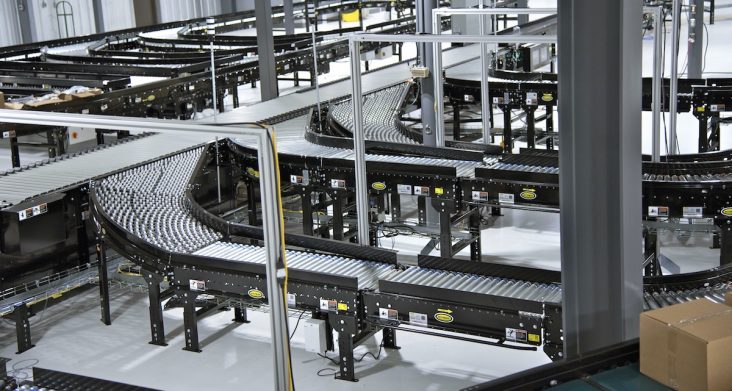Jonesboro regional economy resilient; labor and supply chain issues persist
by March 9, 2022 6:04 pm 932 views

Hytrol's technology center at the company's Jonesboro plant.
For many decades, the city of Jonesboro has been described as an island, or the hub city of Northeast Arkansas. When the national economy soars or plummets, the local impact is typically much less in the most populous city in the region. That dynamic is fueled by population growth, and the diversity of its jobs base.
Supply chain issues, COVID-19, inflation and other factors are projected to have a strong influence on the economy in the coming years.
Government, healthcare, food processing, light manufacturing and transportation jobs are the foundation of the city’s economy, Jonesboro Regional Chamber of Commerce President and CEO Mark Young said at a recent roundtable discussion about 2022 economic forecasts for the city.
He was joined by Bobby Kasserman, market president for First National Bank, Gary Harpole, managing director of Halsey Thrasher Harpole Real Estate, Laura Miller, director of the Small Business & Technology Development Center, Atin Suri, vice president of Jatin Investments, and Amber Jones, marketing director at Hijinx.
Supply chain issues are impacting the real estate market much more than inflation, Harpole said. It can take as long as 18 weeks to get windows, doors or appliances for new houses his company is building. Prices for those and other items are only locked in for a few days and then go up. These lag times eat into potential profits, he added.
“Supply chain issues are a very real problem on the construction side. It’s an interesting time to be in this business,” he said. “The demand is here. The interest rates are low. … It’s been a learning curve.”

Product demands have been high and vendors quickly run out of supplies, Suri and Jones said. Suri’s company operates hotels. Linens and small bottles of shampoo are high demand products in his industry and they are in short supply. When a vendor gets those items in stock, many companies will buy up the whole supply which makes the problem worse, he said.
Cleaning supplies have been hard to keep in stock, Jones said. Her company, Hijinx, is a family entertainment center. The shortages have forced the company to use other vendors they’ve never used, she said.
One problem that has impacted all businesses in every sector is the Omicron variant of COVID-19. Miller said this wave is different than the others. It doesn’t seem to be shutting down businesses, but a lot more people are getting sick, she said.
Harpole concurred. He had to be hospitalized for five days in 2020 with COVID. This wave is more widespread. When it hits an office, it seems like everyone gets it, he said. The fortunate thing is that many workers can still work from home and don’t seem to be getting as sick, he added.
Jones said waves of the virus have impacted her employees since the pandemic started. Hijinx is a service sector business, meaning most workers cannot perform their tasks from home.
“We’ve had two outbreaks among our employees. It’s been devastating,” she said.
Suri echoed Jones’s concerns. If an employee gets infected it doesn’t take long for it to sweep through the entire staff. Despite their best efforts to clean, mask and socially distance it has ravaged their staff.
“There’s nothing we can do to control it,” he said.
As Omicron washed over the region around Christmas it brought into play another issue for the hotel sector. Rooms are often rented for family events during the holiday season and many cancelled plans after family members were infected, Suri said. This was on top of the losses they’d already experienced when travel was almost completely shut down in March 2020.
One positive change has been the U.S. Centers for Disease Control and Prevention (CDC) has changed regulations when it comes to workers returning to work, Kasserman said. Those infected only have to quarantine for five days if their symptoms don’t persist and then they have to wear a mask for another five days but can return.
The quality of the workforce has changed since the pandemic started in 2020. Hijinx might hire five employees and are lucky if three show up when called into work, Jones said. Of those who do show up, one might become a solid employee, she said.
Hijinx employees have to work at night and on weekends and it’s becoming more difficult to find people who want to work those shifts, Jones added. Kasserman said they’ve noticed that new employees don’t just want better pay. The demand for better benefits has been on the rise, too, he said.
Turnover in the hotel sector has been a serious problem, Suri said. Front desk employees have turned over more than 300% in recent months and this lack of employee continuity damages the customer’s experience, he said.
The jobs market is shifting in a major, fundamental way, Harpole said. For centuries, people followed jobs. Employees now value many quality-of-life metrics. Now it’s almost as if the jobs are starting to follow the people, he added.
“With the younger generation it’s hard to keep them and it’s even harder to attract them,” he said.
Dealing with uncertainty will be the main problem businesses will deal with during 2022 and likely into 2023, Young said. On a brighter note, several problems in the jobs market nationally are not impacting Jonesboro the same, he said. In 2016, the city’s labor force numbered about 62,000. This year that number has swelled to 66,500.
“Each year, it continues to improve,” he said.
Miller agreed with Young’s assessment. The headwinds this year are stronger than in some years past, but the growth potential for the city and the surrounding area is unique – just like it’s been for the past 50 years.
“Jonesboro is a great community. We are going to have opportunities to expand,” she said.
